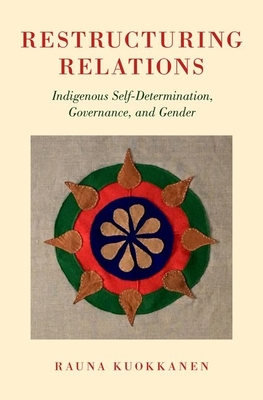Restructuring Relations: Indigenous Self-Determination, Governance, and Gender

Restructuring Relations: Indigenous Self-Determination, Governance, and Gender
Adopted in 2007, the UN Declaration on the Rights of Indigenous Peoples establishes self-determination--including free, prior, and informed consent--as a foundational right and principle. Self-determination, both individual and collective, is among the most important and pressing issues for Indigenous women worldwide. Yet Indigenous women's interests have been overlooked in the formulation of Indigenous self-government, and existing studies of Indigenous self-government largely ignore issues of gender. As such, the current literature on Indigenous governance conceals patriarchal structures and power that create barriers for women to resources and participation in Indigenous societies. Drawing on Indigenous and feminist political and legal theory--as well as extensive participant interviews in Canada, Greenland, and Scandinavia-- this book argues that the current rights discourse and focus on Indigenous-state relations is too limited in scope to convey the full meaning of "self-determination" for Indigenous peoples. The book conceptualizes self-determination as a foundational value informed by the norm of integrity and suggests that Indigenous self-determination cannot be achieved without restructuring all relations of domination nor can it be secured in the absence of gender justice. As a foundational value, self-determination seeks to restructure all relations of domination, not only hegemonic relations with the state. Importantly, it challenges the opposition between "self-determination" and "gender" created and maintained by international law, Indigenous political discourse, and Indigenous institutions. Restructuring relations of domination further entails
examining the gender regimes present in existing Indigenous self-government institutions, interrogating the relationship between Indigenous self-determination and gender violence, and considering future visions of Indigenous self-determination, such as rematriation of Indigenous governance and an independent statehood.
PRP: 893.32 Lei
Acesta este Pretul Recomandat de Producator. Pretul de vanzare al produsului este afisat mai jos.
803.99Lei
803.99Lei
893.32 LeiIndisponibil
Descrierea produsului
Adopted in 2007, the UN Declaration on the Rights of Indigenous Peoples establishes self-determination--including free, prior, and informed consent--as a foundational right and principle. Self-determination, both individual and collective, is among the most important and pressing issues for Indigenous women worldwide. Yet Indigenous women's interests have been overlooked in the formulation of Indigenous self-government, and existing studies of Indigenous self-government largely ignore issues of gender. As such, the current literature on Indigenous governance conceals patriarchal structures and power that create barriers for women to resources and participation in Indigenous societies. Drawing on Indigenous and feminist political and legal theory--as well as extensive participant interviews in Canada, Greenland, and Scandinavia-- this book argues that the current rights discourse and focus on Indigenous-state relations is too limited in scope to convey the full meaning of "self-determination" for Indigenous peoples. The book conceptualizes self-determination as a foundational value informed by the norm of integrity and suggests that Indigenous self-determination cannot be achieved without restructuring all relations of domination nor can it be secured in the absence of gender justice. As a foundational value, self-determination seeks to restructure all relations of domination, not only hegemonic relations with the state. Importantly, it challenges the opposition between "self-determination" and "gender" created and maintained by international law, Indigenous political discourse, and Indigenous institutions. Restructuring relations of domination further entails
examining the gender regimes present in existing Indigenous self-government institutions, interrogating the relationship between Indigenous self-determination and gender violence, and considering future visions of Indigenous self-determination, such as rematriation of Indigenous governance and an independent statehood.
Detaliile produsului









